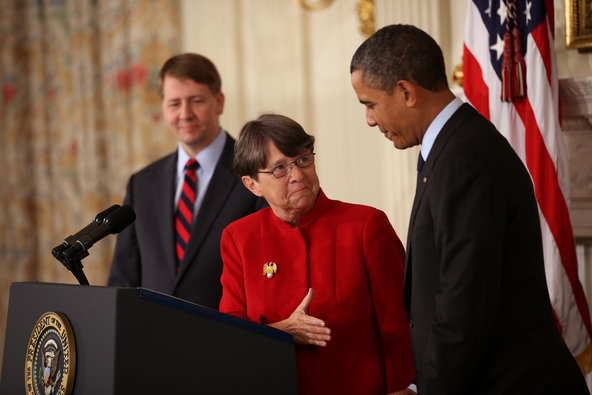Mr. Gandolfini’s death was confirmed by HBO. He was traveling in Rome, where he was on vacation and was scheduled to attend the Taormina Film Fest. The cause was not immediately announced; an HBO press representative said that Mr. Gandolfini may have had a heart attack.
Mr. Gandolfini, who grew up in Park Ridge, in Bergen County, N.J., came to embody the resilience of the Garden State on “The Sopranos,” which made its debut in 1999 and ran for six seasons on HBO.
In its pilot episode viewers were introduced to the complicated life of Tony Soprano, a New Jersey mob kingpin who suffers panic attacks and begins seeing a psychiatrist. Over 86 episodes, audiences followed Mr. Gandolfini in the role as he was tormented by his mother (played by Nancy Marchand), his wife (Edie Falco), rival mobsters, the occasional surreal dream sequence and, in 2007, an ambiguous series finale that left millions of viewers wondering whether Tony Soprano had met his fate at a restaurant table.
The success of “The Sopranos” helped make HBO a dominant player in the competitive field of scripted television programming and transformed Mr. Gandolfini from a character actor into a star. The series, created by David Chase, won two Emmys for outstanding drama series, and Mr. Gandolfini won three Emmys for outstanding lead actor in a drama. He was nominated six times for the award.
HBO said of Mr. Gandolfini in a statement on Wednesday, “He was a special man, a great talent, but more importantly, a gentle and loving person who treated everyone no matter their title or position with equal respect.”
Mr. Chase, in a statement, called Mr. Gandolfini “one of the greatest actors of this or any time,” and said, “A great deal of that genius resided in those sad eyes.” He added: “I remember telling him many times: ‘You don’t get it. You’re like Mozart.’ There would be silence at the other end of the phone.”
James Joseph Gandolfini Jr. was born in Westwood, N.J., on Sept. 18, 1961. His father was an Italian immigrant who held a number of jobs, including janitor, bricklayer and mason. His mother, Santa, was a high school cafeteria chef.
He attended Park Ridge High School and Rutgers University, graduating in 1983 with a degree in communications. He drove a delivery truck, managed nightclubs and tended bar in Manhattan before becoming interested in acting at age 25, when a friend took him to an acting class.
He began his movie career in 1987 in the low-budget horror comedy “Shock! Shock! Shock!” In 1992 he had a small part in the Broadway revival of “A Streetcar Named Desire,” starring Alec Baldwin and Jessica Lange.
By the mid-1990s Mr. Gandolfini had made gangster roles a specialty, playing burly but strangely charming tough guys in films like “True Romance” (1993) and “The Juror” (1996). He had an impressive list of character-acting credits, but was largely unknown when Mr. Chase cast him in “The Sopranos” in 1999.
“I thought it was a wonderful script,” Mr. Gandolfini told Newsweek in 2001, recalling his audition. “I thought, ‘I can do this.’ But I thought they would hire someone a little more debonair, shall we say. A little more appealing to the eye.”
“The Sopranos,” which also became a springboard for television writers like Matthew Weiner (who would later create the AMC drama “Mad Men”) and Terence Winter (who later created the HBO series “Boardwalk Empire”), drew widespread acclaim for its detailed studies of the lives of its characters, and, at its center, Mr. Gandolfini’s portrayal of Tony Soprano, who was tightly wound and prone to acts of furious violence. (He beat and choked another mobster to death for insulting the memory of his beloved deceased racehorse, to name but one example.)

Peter Keepnews contributed reporting.
Article source: http://www.nytimes.com/2013/06/20/arts/television/james-gandolfini-sopranos-star-dies-at-51.html?partner=rss&emc=rss
